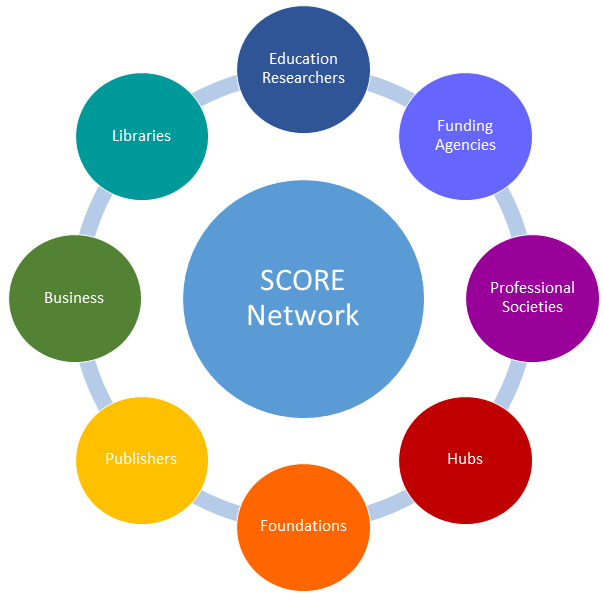Sustainability Challenges for Open Resources to promote an Equitable Undergraduate Biology Education (SCORE-UBE)
Pilot Program Description
SCORE COLLABORATIVE PILOT PROGRAM
Issue Date: April 13, 2020
SYNOPSIS OF PROGRAM
Summary: Dr. Carrie Diaz Eaton and Bates College have recently been awarded funding by the William and Flora Hewlett Foundation's Education Program to support nascent collaborations and pilot projects which have arisen from within the SCORE Network, with a particular focus on collaborations between disciplinary-based projects and broader OER, state, and library communities. We seek to support projects whose outcomes will benefit the wider SCORE Network and foster the development of sustainable solutions to issues pertinent to the Network, including, but not limited to: 1) balancing a commitment to freely available education resources and professional development with the demands to stay relevant, 2) closing the OER lifecycle, 3) bridging disciplinary conversations with institutional conversations, and 4) ensuring financial sustainability. As part of this program, Bates College will provide targeted funding, in the form of mini-grants, to enable organizations to proceed with establishing collaborations and piloting solutions to the issues identified above.
SUMMARY/BACKGROUND INFORMATION
Interdisciplinary fields are particular drivers of STEM inequity. Only certain institutions, instructors, and classrooms have access to the fast-moving, often quantitative and computational research and curricula that students need in order to compete. By participating in the adoption and production of OER, educators get access to high-quality materials in emerging interdisciplinary fields, gain opportunities to shape these OER into what is relevant for their classrooms, and can contribute to creating a shared resource to benefit others. However, this new model of educational material development presents new challenges, specifically the need to develop human-technological infrastructure that is also financially, socio-culturally, and technologically sustainable.
The SCORE Network was founded to connect stakeholders from a variety of disciplines and organizations who share a common interest in undergraduate biology OER, sustainability, and social justice and equity, but who have not previously been connected. With a recognition that a wealth of knowledge pertinent to the issues we seek to address lives in domains outside of biology, we actively sought to include representatives from libraries/information science, social science, or other STEM disciplines as well as from businesses, OER organizations, and multiple types of funding organizations in our Network.
With support from the National Science Foundation, the first SCORE Summit brought together members of the Network in October 2019. The goal of this meeting was to identify challenges that are common across projects and to leverage the strengths and best ideas from each project to benefit the others. The common challenges identified were: 1) balancing a commitment to freely available education resources and professional development with the demands to stay relevant, 2) closing the OER lifecycle, 3) bridging disciplinary conversations with institutional conversations, and 4) ensuring financial sustainability.
PROGRAM DESCRIPTION
Our long-term goal is to help our broader STEM education OER community to develop sustainable solutions to common problems facing OER projects through collaboration. The SCORE Summit was successful in fostering ideas for new relationships and collaborations. Now, with funding from the William and Flora Hewlett Foundation's Education Program, we seek to promote and strengthen these nascent collaborations by providing immediate funding in the form of mini-grants (up to $20,000 per grant) to catalyze projects focused on a variety of issues of interest to the SCORE Network.
We anticipate supporting up to five projects that will provide tangible examples of potential solutions to issues common across multiple Network members/projects. Members of the SCORE Network are eligible to submit proposals as Principal Investigator. Each proposal should have a collaborating investigator/co-principal investigator from within the members and/or projects of the SCORE Network. Additional collaborating investigators are welcome, but not required.
The scope of proposed projects should match the funding limits and timelines. Projects are limited to $20,000 in total costs and should be completed within approximately 6 months. The products produced as a result of these grants will be dependent on the grant activities, but should include elements relevant to the broader SCORE and will likely include documentation of the collaborative process. This may include, but is not limited to, workflows for combining cyberinfrastructure across multiple projects and aligning metadata across projects, production of additional OER undergraduate biology lessons, and/or preliminary research data from new collaborations to be used for further grant applications. The products produced by proposed projects and their relevance to the broader SCORE Network should be described in the Project Description portion of the application.
Evaluation will be a key component of successful applications. Funds to support project evaluation are provided for separately and should not be included in the budget for each project. A common evaluator will be used across all projects to facilitate an overall evaluation report on effectiveness of the SCORE Collaborative Pilot Program and collaborations. Robin Taylor, PhD of RTRES Consulting is the evaluator for the SCORE Network project and will serve as evaluator for SCORE Collaborative Pilot Program grants.
Grant awardees will be asked to support evaluation efforts of the grant by responding to all evaluation data requests in a timely-manner.
Open Licensing: Successful applications will be expected to comply with the Hewlett Foundation’s Commitment to Open Licensing Policy. Final materials (reports, videos, white papers, etc) created with funds from the SCORE Collaborative Pilot Program should be openly licensed. under the most recent Creative Commons Attribution license. Products relevant to the SCORE Network should be made freely available to the Network. If necessary, funds to support open access to Program products should be included in the budget description.
